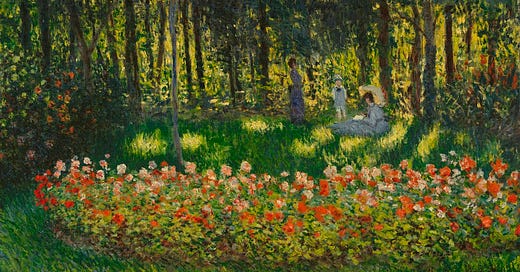I was obsessed with beauty when I was a teenager. Not the kind of beauty that sprouts in the wild - the sound of a creek winding through a damp forest, or a rainbow arching over a misty sea, or a line of baby chicks filing behind their mother. Not the kind of beauty that exists in the absence of humans. Is a tree in a forest beautiful if no one is around to see it?
No. Not even the kind that is made in response to the beauty of the natural world - a painting, a song, a poem. The obsession revolved around manufactured beauty. The ready-made kind of beauty that I could access at the touch of a button, in a matter of seconds. A Lean Cuisine kind of beautiful. I followed every pretty girl on Instagram. Every supermodel, every actress, every influencer. My feed was overflowed with Kardashian and Alexis Ren body doubles and I consumed them routinely like a vitamin. I discussed who the most beautiful girls at school were with my friends. I tuned into Twitter’s commentary of the annual Victoria’s Secret Fashion Show closely. I evaluated the gaits of supermodels. I, of course, didn’t know how one was supposed to walk on a runway. I could barely walk on the edge of a public swimming pool in a bikini.
Force-feeding myself beautiful women was an interesting choice given that I was also terrified of beautiful women. Well, terrified might not be the right word. I was more so paralyzed by them. Transfixed. Incapacitated. Helpless. Seeing hundreds of images of painstakingly beautiful women a day was like watching a car crash. A seven-car pileup, mouth agape, slowing down your vehicle on the 405, bottlenecking the traffic.
I was both so aware of their mass adoration and my lacking in comparison that it felt like I had no choice but to stare and consume. Call it masochism? Maybe, but I wasn’t exactly deriving pleasure from the experience. Studying? Not exactly that either. While I engaged in surveillance checks of my own body - the kind of routine, bordering orthorexic behavior that is unfortunately common in young girls - I wasn’t exactly trying to change my appearance to look like these women either. I recognized the limits of what my teenage body and its lack of material resources were capable of. I accepted what I perceived to be a personal drought.
Rather I think I developed this obsession with impossibly beautiful women for the reasons of a ruthless realist. The same reasons why when asked if I want the bad news or good news first I almost always ask for the bad news. Murphy’s Law says that “anything that can go wrong will go wrong, and at the worst possible time.” And under the rules of patriarchy and capitalism, the worst possible thing a woman can be is unfit for consumption. And as the Law goes, I was undoubtedly unfit for consumption at the time I desired it most.
I’ve heard people - including myself - say that it’s impossible to be simultaneously smart and happy. For a long time, especially during my teenage years, I thought that to be “awake” in this world meant being as aware of the world’s atrocities as possible. Choosing to shun oneself from the fact that life is replete with suffering was to choose aloofness. Was to choose to be entertained by the shadow puppets on the walls of Plato’s cave, rather than step outside and feel the very real, very hot sun scorch your skin until it blisters.
To live life was to experience pain. And to hide from that pain was to not really live. And so I fittingly chose to fling open the floodgates, make myself as aware of my deficiencies as possible. Burn myself before the sun’s rays could sting me themselves.
Those that engage in self-deprecation will relate to this desire to experience the so-called “real.” Before people can point out your crooked tooth, you draw attention to it yourself. Before you fail your exam, you accept defeat - call yourself stupid. In every realm of life, I had this instinct to assume the worst possible scenario would occur. If whatever can go wrong will go wrong at the worst possible time, I should just expect things to always go wrong and then they’ll always go right - right? Try to fool Murphy’s Law with reverse psychology.
I wanted to be as terribly cognizant of my inadequacies as possible to avoid any of them somehow catching me off guard. How embarrassing would it feel to apply for a job, feeling confident about my chances, and then not rise to the occasion? How ashamed would I feel walking into a room, thinking I was wearing an appealing outfit, only to learn that everybody despised the way I looked? I just couldn’t stomach the possibility - the chances weren’t worth taking.
And so I went into tests with the mindset of having already failed them. Approached the lunch table already babbling about my bad hair day. And I scrolled and scrolled, perpetually presenting myself with a reality check. This is how the most beautiful and successful women in the world look and behave. And you neither look nor behave like them.
The main issue with this mindset - other than it obviously being a relentless form of self-bullying - is that no one else is going to want to be your cheerleader if you can’t give them something to cheer for. Why would an audience want to applaud a performer who simply stands on stage and says “I hate myself” into a microphone repeatedly? Of course, if we’re fortunate enough, we have friends and family members who try their best to carry us across the finish line. During times of stress, sadness, and grief, we all need to lean on one another. Relationships consist of a constant shifting of weight - see-sawing here and there, providing the support where it’s needed.
At the same time, there’s only so much weight humans can carry. And when no one is left to help you drag your feet, you simply become immobile. Numb and blinking at the people around you moving forward. And that’s a lonely way to live.
I began pulling myself out of my self-deprecating state when I realized that my efforts - and my efforts alone - were the only ones that could truly rescue me. If the only true constant in my life was going to be me and that voice inside my head, I might as well make it a voice that has an ounce of hope.
At first, it felt like charity work of sorts - taking pity on a subject that I indeed pitied, but felt a level of distance from. It wasn’t until I learned how to lean into that distance and bear witness to my feelings of inadequacy - step outside of myself and look at them as I would a friend’s suffering - could I truly soften.
Over time - after years of further softening, further witnessing - I’ve learned that the things I once detested about myself only hold weight if I want them to. When I began my life’s journey, there was no contract I signed that proclaimed I had to be the most likable, most charismatic, most beautiful person in the world. In fact, maybe it’s best if I’m not those things.
Especially when it comes to being the most beautiful girl in the world. I knew tangentially that being beautiful wasn’t the most important thing someone could be - the feminist in me wanted it to be true. And yet, I beat myself up relentlessly for not meeting some visual metric I set for myself in my head, my cognitive dissonance hardening. When I reflect now, I wonder how many hours I collectively worried about my lack of vanity. The long stares in mirrors and then the avoidance of mirrors. The 5:30 AM alarms to apply coats of concealer for homeroom. The hours of scrolling, of zooming, of analyzing. All for some trophy that I didn’t even really need.
To think of where those hours could have been better spent - put towards truly showing up for myself and others. Towards basking in the real beauty of life - the natural world and its order, connections between humans, the idiosyncratic qualities of people. In a culture that puts so much emphasis on conventional beauty as empowerment, it can feel odd to say that being beautiful doesn’t matter. But it doesn’t.
Unlocking the shackles fastened by our inner critic occurs when we learn that the meaning of life is radically arbitrary. Around the world, people devise countless fables to communicate life lessons to future generations. Media attempts to set agendas - tell us where we should be throwing our money, time, and attention. With all of these sentiments swirling around in our minds, it can be challenging to figure out what to do - what to think. But when you zoom out and visualize the hundreds of billions of galaxies in our observable universe, human ambition feels futile. Puny. Especially those ambitions related to surface-level desires. When taking this one billion-foot view, it becomes quite clear that very little that we worry about matters. And because of that, anything can matter. We have the power to construct our own meaning.
Hyperfixating on what you perceive to be your deficiencies doesn’t somehow protect you from the crass nature of reality. It shields you from living a fulfilling life - one that requires a soft interior to embrace and an open mind to create.




![Claude Monet - In the Garden, the Artist's Family [1875] | Flickr Claude Monet - In the Garden, the Artist's Family [1875] | Flickr](https://substackcdn.com/image/fetch/w_1456,c_limit,f_auto,q_auto:good,fl_progressive:steep/https%3A%2F%2Fsubstack-post-media.s3.amazonaws.com%2Fpublic%2Fimages%2Fea557dad-90a4-4502-972c-cf9e0b4a0d3c_1024x771.jpeg)

Really wonderful writing ! Thank you !